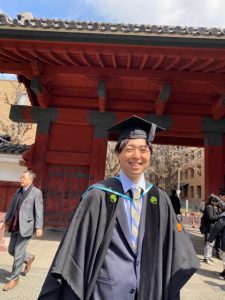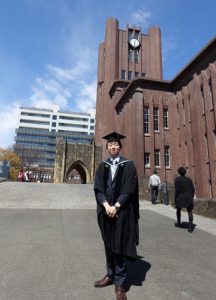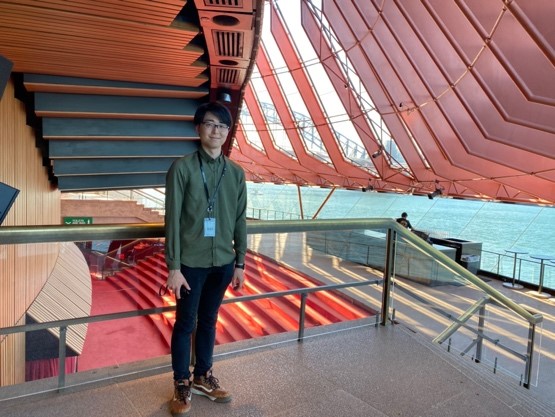Stepping into the economics field from an architecture background
 I graduated from the University of Tokyo with a degree in architecture. As a member of the architectural planning laboratory, I studied the relationship between architecture and society. Architecture plays an important role in the social system, and it requires not only engineering but also social science perspectives, such as law and economics. For example, in my graduation research, I studied the real estate registry, referred to Section Ownership Law, and examined real estate transaction prices to see how they were linked to the state of the Japanese economy. Since I originally entered university as a science major, I had to study other fields by myself. The main reason why I applied to GraSPP was that I wanted to study them systematically.
I graduated from the University of Tokyo with a degree in architecture. As a member of the architectural planning laboratory, I studied the relationship between architecture and society. Architecture plays an important role in the social system, and it requires not only engineering but also social science perspectives, such as law and economics. For example, in my graduation research, I studied the real estate registry, referred to Section Ownership Law, and examined real estate transaction prices to see how they were linked to the state of the Japanese economy. Since I originally entered university as a science major, I had to study other fields by myself. The main reason why I applied to GraSPP was that I wanted to study them systematically.
Because I was particularly interested in economics, I chose the Economic Policy Course and took the entrance exam with the economics subjects. Since I was almost a beginner in this sphere, I used undergraduate-level textbooks and problem sets to prepare for the exam.
Once I became part of GraSPP, I noticed one of the appealing features of GraSPP – the diverse backgrounds of students from various departments. There are six different courses within GraSPP, and when I am in the same class with students from other courses, I was amazed by the difference in perspectives. Personally, I would like to see more science students challenging to enroll in GraSPP, as the school will consider your undergraduate majors during the admissions evaluation process.
Benefitting from the wide range of classes and networks in GraSPP
 One of the impressive things about GraSPP was the wide range of classes. Originally, I was interested in urban policy, but I became interested in quantitative data analysis to formulate real-world policies, such as economic evaluation of public policy and econometrics. Besides, you can take courses in other departments t, so I was able to attend more specialized classes at the Graduate School of Economics. It was also stimulating to be able to look into subjects that I had never studied at all before, such as politics and law, because lectures for beginners were also offered.
One of the impressive things about GraSPP was the wide range of classes. Originally, I was interested in urban policy, but I became interested in quantitative data analysis to formulate real-world policies, such as economic evaluation of public policy and econometrics. Besides, you can take courses in other departments t, so I was able to attend more specialized classes at the Graduate School of Economics. It was also stimulating to be able to look into subjects that I had never studied at all before, such as politics and law, because lectures for beginners were also offered.
The other thing is the breadth of networking. After entering GraSPP, I reconsidered my path and sought a career as a national public servant, which I had not previously aspired to. Although I made this decision relatively late in my job-hunting process, having so many senior students and classmates around me, who were aiming for the same path, helped me to receive more information, and consult with them about job-hunting. In addition, I was able to consult with the professors, who helped me in choosing my career path, and I think I was able to gain a different perspective.
Next year, I will be working as a national public servant in Japan. It is difficult to imagine how I will be able to make use of what I have learned in GraSPP at this point, but I would like to contribute to evidence-based policymaking by using the methods of economic analysis. I chose a path where I can, most effectively, make use of this experience gained at GraSPP, and once again I am glad to have the opportunity to study here.



